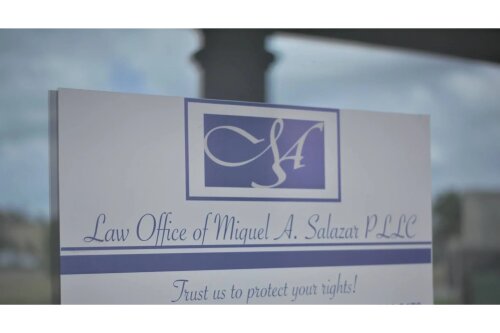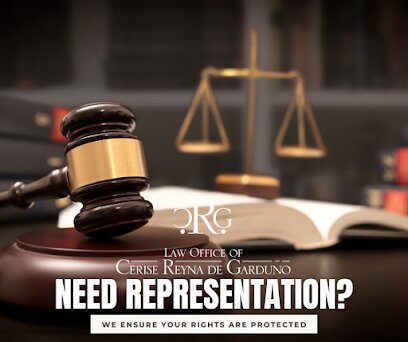Best Bail Bond Service Lawyers in Brownsville
Share your needs with us, get contacted by law firms.
Free. Takes 2 min.
List of the best lawyers in Brownsville, United States
About Bail Bond Service Law in Brownsville, United States
Bail bond services let people who have been arrested secure release from jail by providing a financial guarantee that the defendant will return for required court appearances. In Brownsville, which is in Cameron County, bail and release procedures follow Texas state law while local courts and the county jail handle day-to-day processing. Bail can be posted directly to the court as a cash bond, or a licensed bail bond agent can post a surety bond for a fee and typically with collateral or an indemnity agreement. Understanding how bail is set, what kinds of bonds are available, and the role of both the court and the bail bond agent will help you make timely decisions after an arrest.
Why You May Need a Lawyer
A lawyer can help at multiple stages of a bail-related matter. Common reasons to seek legal help include: ensuring a fair bail determination at the magistrate or bond hearing; challenging an excessive bail amount; responding to a bail forfeiture notice if the defendant misses a court date; negotiating conditions of release or modifications; addressing bond revocation proceedings; protecting constitutional rights during initial proceedings; advising when immigration detainers or federal issues are involved; and representing co-signers or indemnitors who face collections or civil claims by a bondsman. An attorney also explains alternatives to surety bonds, such as supervised release or personal-recognizance bonds, and can coordinate with the bondsman so release and court compliance proceed smoothly.
Local Laws Overview
Key legal points to know for bail bond matters in Brownsville include the following.
- Who sets bail: A magistrate or judge sets bail based on the charge, criminal history, flight risk, and public-safety considerations. For local ordinance or misdemeanor matters, municipal or county courts will typically handle bail. Felony charges are handled by county or district courts.
- Types of bonds: Common types are cash bonds (full amount paid to the court), surety bonds (posted by licensed bail bond agents), personal-recognizance bonds (release on promise to appear), and in some cases property bonds or other secured bonds. Availability depends on the charge and court discretion.
- Licensing and regulation: Bail bond agents must be licensed under Texas state law and comply with state regulations. Agents use written indemnity agreements and often require collateral to secure a surety bond.
- Fees and collateral: Bondsmen normally charge a nonrefundable premium for a surety bond. Agents may require collateral or a cosigner. State rules, court orders, and agent contracts affect what can be required and how collateral can be used to satisfy obligations.
- Forfeiture and surrender: If a defendant misses court, the court can declare bond forfeiture. A bondsman may then seek to recover the full bail amount from collateral or through legal action. Courts may allow motion to set aside forfeiture if the defendant is returned or good cause is shown within a specified time period.
- Revocation and conditions: Release conditions may include travel restrictions, electronic monitoring, or reporting requirements. Violating release conditions can lead to revocation of bail and re-arrest.
- Interplay with immigration and federal holds: Federal immigration detainers or federal criminal charges can affect release even if state bail is met. Consult counsel if immigration status may be implicated.
- Local procedures and timelines: Local rules in Brownsville courts and Cameron County detention operations determine booking, initial magistrate appearances, bail posting procedures, and how quickly bonds are processed. Contacting the jail or court to confirm procedures speeds release.
Frequently Asked Questions
What is a bail bond and how does it work?
A bail bond is a promise backed by a payment or surety that the defendant will return to court. There are cash bonds, where the full amount is paid to the court and refunded minus fees if conditions are met; and surety bonds, where a licensed bondsman posts the full bail with the court for a fee and usually secures collateral or an indemnity agreement from the defendant or a cosigner.
How quickly can someone be released after posting a bond in Brownsville?
Release time varies by jail workload, processing steps, and whether paperwork is complete. After a bond is accepted, processing typically takes hours but can take longer during busy periods or when there are holds, warrants, or paperwork issues. Contacting the detention center and the court helps estimate timing.
How much does a bail bond cost?
Bail bond fees depend on the bondsman and the circumstances. Many bondsmen charge a nonrefundable premium that is a percentage of the bail amount, and they often require collateral or a cosigner. Because rates and practices vary, ask a licensed local bondsman for a clear written estimate before signing anything.
Can a judge deny bail in Brownsville?
Yes. Judges can deny bail in limited circumstances, such as when the defendant poses a significant flight risk or a danger to public safety, or when mandated by law for certain offenses. The specific legal standards depend on the charge and applicable Texas law.
What happens if the defendant misses a court date?
If a defendant misses a court date, the court may issue a failure-to-appear warrant and declare bond forfeiture. A bondsman may then pursue surrender, locate the defendant, or seek collateral to cover the bail amount. There are procedures for motions to set aside forfeiture if the defendant is located and returned or if good cause is shown.
Can family members or friends cosign or post collateral?
Yes. Family or friends can cosign an indemnity agreement and provide collateral to secure a bail bond. Cosigners should understand they are legally responsible if the defendant fails to appear, including potential loss of collateral or civil liability to the bondsman.
How do I know if a bail bondsman is licensed and reputable?
Only use licensed bail bond agents. You can confirm licensing with the relevant state regulator and ask for the agent’s license number. Ask for a written contract that details fees, collateral requirements, and grounds for seizure or forfeiture. Seek referrals, check local reviews, and consider consulting an attorney if you have concerns about the agreement.
Is the premium refundable if the defendant is found not guilty?
Premiums paid to a bondsman are typically nonrefundable, regardless of the case outcome, because the fee compensates the agent for taking the risk of posting the bond. Any cash or property posted directly with the court as a cash bond may be refundable at case conclusion, subject to court deductions and compliance with court conditions.
What are my rights as a cosigner or indemnitor?
Cosigners should be given a written contract that explains obligations, methods of payment, how collateral will be used, and conditions under which the bondsman may locate the defendant or pursue recovery. Cosigners have the right to review the paperwork and ask for legal advice before signing. If disputes arise, consult an attorney promptly to protect your rights.
When should I contact a lawyer rather than just a bondsman?
Contact a lawyer if bail seems excessive, if the court threatens forfeiture, if there are complicated legal or immigration issues, if the bondsman threatens unlawful or aggressive collection measures, or whenever you need legal strategy for the underlying charge. A lawyer can also attend hearings to seek reduced bail, alternative release conditions, or to contest revocation or forfeiture.
Additional Resources
For local and state resources related to bail bond matters, consider contacting the following organizations and offices for information and assistance.
- Brownsville Municipal Court - for municipal citations and procedures related to local offenses.
- Cameron County Courts and Cameron County District Clerk - for felony and county court records, dockets, and filings.
- Cameron County Sheriff - Detention Center - for incarceration status and booking questions.
- State regulator for bail bond agents - verify licensing and complaint procedures with the appropriate Texas state agency that oversees bail agents and insurance-related licensing.
- State Bar of Texas or local bar associations - for lawyer referrals and lawyer disciplinary information.
- Legal aid and public defender offices - for people who cannot afford private counsel and who may qualify for appointed counsel or public defense.
- National and state bail industry or consumer organizations - for general education about how bail bonds work and consumer protections.
Next Steps
If you or a loved one needs legal assistance related to a bail bond in Brownsville, follow these steps to protect rights and speed release.
- Confirm the detention location and the exact charges by calling the jail or checking with the arresting agency.
- Ask the jail or court how to post bond: whether they accept cash, cashier's check, money order, or require a surety bond from a licensed agent.
- Contact a licensed local bail bond agent if you plan to use a surety bond. Get a written contract that spells out fees, collateral, and obligations before signing.
- Consult a lawyer as soon as possible if bail appears excessive, if there are immigration concerns, if you are a cosigner worried about exposure, or if you expect bond forfeiture or revocation issues. Use a lawyer referral service if you need help finding counsel.
- Keep calendars and alerts for all court dates, follow all release conditions, and maintain contact with the bondsman and attorney to avoid inadvertent forfeiture.
- If you encounter problems with a bondsman or suspect misconduct, document communications, keep copies of all agreements, and report concerns to the licensing authority while seeking legal advice.
This guide is for informational purposes and does not replace legal advice. For questions about a specific case, contact a licensed attorney in Brownsville or the appropriate court or regulatory office.
Lawzana helps you find the best lawyers and law firms in Brownsville through a curated and pre-screened list of qualified legal professionals. Our platform offers rankings and detailed profiles of attorneys and law firms, allowing you to compare based on practice areas, including Bail Bond Service, experience, and client feedback.
Each profile includes a description of the firm's areas of practice, client reviews, team members and partners, year of establishment, spoken languages, office locations, contact information, social media presence, and any published articles or resources. Most firms on our platform speak English and are experienced in both local and international legal matters.
Get a quote from top-rated law firms in Brownsville, United States — quickly, securely, and without unnecessary hassle.
Disclaimer:
The information provided on this page is for general informational purposes only and does not constitute legal advice. While we strive to ensure the accuracy and relevance of the content, legal information may change over time, and interpretations of the law can vary. You should always consult with a qualified legal professional for advice specific to your situation.
We disclaim all liability for actions taken or not taken based on the content of this page. If you believe any information is incorrect or outdated, please contact us, and we will review and update it where appropriate.










